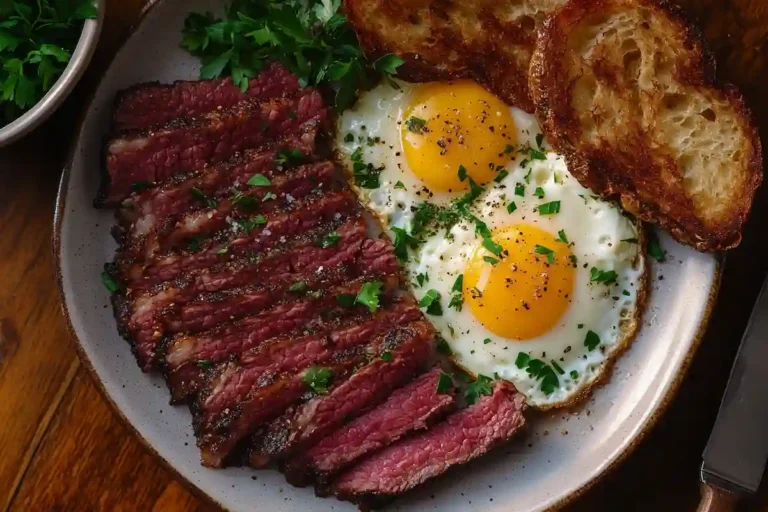Introduction
Wondering Is corned beef good for breakfast? You’re not alone. This hearty, salt-cured brisket often appears in discussions about balanced meals and healthy breakfast ideas. In this article, we’ll examine its nutritional profile, consider potential benefits and drawbacks, explore recipe ideas, and even dive into cultural traditions. We’ll also share expert tips on how to enjoy corned beef hash and other breakfast-friendly dishes while keeping an eye on moderation. So, if you’ve ever craved a savory start to your day or are curious about delicious leftover corned beef recipes, read on!
1. Introduction: Why Corned Beef for Breakfast?
A Brief History of Corned Beef
Corned beef has been around for centuries, but is corned beef good for breakfast? Many folks don’t realize just how widespread this savory meat is. The term “corned” refers to the large grains of salt—historically called “corns of salt”—used in curing the beef. Ireland’s longstanding tradition of curing beef in rock salt made this product famous, and it later traveled to other parts of the globe. Early settlers and travelers relied on corned beef because it was more shelf-stable than fresh cuts. This durability helped them stretch resources and enjoy family-friendly breakfasts wherever they settled.
Over time, corned beef became symbolic of hearty meals. While often served for lunch or dinner, many began asking, is corned beef good for breakfast? For instance, in the United States, corned beef hash rose to fame as a budget-friendly dish during wartime rationing. This sizzling skillet recipe combined chopped beef, potatoes, and onions in a way that added flavor, texture, and a much-needed morning energy boost. Today, corned beef hash remains a go-to comfort food for those seeking a satisfying and savory start to their day.
Cultural Significance and Morning Meal Traditions
Different cultures have their own twists on corned beef breakfasts. Some enjoy it with eggs and toast, while others pile it into a sandwich with pickles or fry it into a crispy hash. Certain regions even serve it as part of a traditional Irish breakfast, paired with fried potatoes and beans. But if you’re wondering, is corned beef good for breakfast beyond these traditions? The answer depends on how you prepare it and what you pair it with. Although corned beef is often associated with St. Patrick’s Day in the United States, there’s no rule that says you can’t savor it in the morning.
In many places, this high-protein breakfast option is cherished as a filling and flavorful treat. Combining corned beef with bright veggies and savory seasonings can elevate it into an irresistible dish that’s both hearty and simple to prepare. If you’re curious is corned beef good for breakfast for your diet, consider examining its nutritional profile and weighing any processed meat considerations. By thinking about your dietary needs and choosing balanced sides, you can enjoy corned beef in the morning while staying mindful of your health.
2. Nutritional Profile: Is Corned Beef Healthy in the Morning?
Macronutrients and Protein Content
Corned beef is often praised for its high-protein breakfast potential, but is corned beef good for breakfast when it comes to actual macronutrients? Generally, a three-ounce serving can provide around 15–20 grams of protein, which is quite substantial for a morning meal. Moreover, protein helps repair muscles, boosts metabolism, and supports healthy tissue formation. However, it’s also worth noting that corned beef typically includes more fat than leaner cuts like chicken breast or turkey bacon. Despite its richness, many folks still enjoy it for its savory flavor and satisfying texture.
Additionally, corned beef tends to be low in carbohydrates, which appeals to people aiming for a low-carb breakfast. Still, moderation remains crucial. Balancing corned beef with nutrient-dense sides—such as vegetables, whole grains, or fresh fruit—can create a healthier plate without sacrificing taste. When viewed in the broader context of a daily diet, corned beef can fit nicely, but it’s wise to keep an eye on portion sizes.
Vitamins, Minerals, and Sodium Levels
Although corned beef supplies key minerals like iron and zinc, it can also come with a hefty sodium load—due to the curing process. Iron is essential for oxygen transport in the blood, and zinc helps support immune function. Corned beef may also provide B vitamins, like vitamin B12 and niacin, which help maintain energy and overall metabolism.
On the flip side, the salt-cured brisket can deliver upwards of 800–1,000 milligrams of sodium per serving. That figure might be concerning for individuals watching their sodium intake. Nevertheless, pairing corned beef with potassium-rich foods like spinach or tomatoes can help mitigate some of those effects. In the end, you can enjoy corned beef for breakfast if you balance it with other nutrients.
Comparing Corned Beef to Other Breakfast Meats
When stacked against traditional breakfast meats—like bacon, sausage, or ham—corned beef often contains similar levels of protein but can have a higher salt content. Bacon may offer slightly more flavor intensity, while ham sometimes comes with extra additives. Sausage varies widely depending on the brand or recipe. Corned beef, however, stands out for its unique curing style and comfort food appeal.
If you’re looking to switch things up, you could try lean beef alternatives or plant-based proteins. But if corned beef hash or corned beef and eggs is your preference, you can still enjoy it by monitoring portion sizes. With simple planning, this processed meat can be part of a well-balanced day. For more meaty inspiration, you might explore How to Cook a Perfect Beef Roast: Ultimate Guide on Smart’s Recipes, which offers broader insights into preparing beef dishes at home.
3. Health Benefits of Eating Corned Beef for Breakfast
High-Protein Advantages
Protein is vital for muscle recovery, hormone production, and countless bodily processes. Starting your day with a protein-packed meal can help you feel full longer, which may lead to fewer unhealthy snack cravings later on. This raises an interesting question: Is corned beef good for breakfast when considering its protein content? The answer is often yes, as corned beef delivers a satisfying dose of protein that can act as a morning energy boost for your body. Plus, its savory taste might curb your appetite more effectively than sugary cereals, helping you avoid mid-morning blood sugar crashes.
Additionally, research suggests that a high-protein breakfast is linked to improved focus and concentration throughout the day. This benefit is especially useful for students, office workers, or anyone needing sustained mental stamina to power through their mornings. While some caution against overconsumption of red meat, enjoying corned beef hash or a lean portion of corned beef in moderation could fit well into your weekly meal rotation. Balancing it with nutrient-rich sides like leafy greens or whole grains ensures you’re making the most of this hearty breakfast option without compromising your health goals.
Energy Boost and Satiety Factors
Wondering again, Is corned beef good for breakfast? Yes, it can be—especially if you want a hearty meal to keep you going. Because corned beef is relatively dense in calories and protein, it can help curb hunger pangs. Meanwhile, the salt can support fluid balance, though too much sodium can impact blood pressure. Striking the right balance is key.
In addition, the dense texture and bold flavor encourage slower, more mindful eating. Rather than wolfing down your meal, you may find yourself savoring each bite. Ultimately, this can reduce overall food intake and heighten mealtime enjoyment. Pairing corned beef with veggies or whole-grain toast further enhances satiety, ensuring you won’t feel the urge to snack before lunch.
Role of Corned Beef in Balanced Diets
Including corned beef in a balanced diet requires thoughtful planning. Many health-conscious individuals make room for heart health considerations by limiting saturated fat and salt. However, lean corned beef options exist, and controlled portions can minimize any potential downsides. Adding a fresh salad or even fruit on the side can round out your plate with antioxidants, vitamins, and minerals.
If you’re still unsure, consider exploring leftover corned beef recipes that mix in beans, vegetables, or whole grains. These recipes often yield a more balanced nutritional profile. Also, incorporating a variety of protein sources—such as fish, poultry, or plant-based proteins—can prevent monotony and keep your diet rich in essential nutrients. By looking at the bigger picture of your eating habits, you can decide if corned beef truly belongs on your morning menu.
4. Potential Drawbacks and Considerations
Sodium and Preservatives
Although many people love corned beef for its rich flavor, it’s important to note that the curing process involves salt and other additives. These methods help preserve the meat and enhance its taste. Yet high levels of sodium can be concerning for those watching their blood pressure or aiming for a lower-salt diet. Moreover, some brands use nitrates or nitrites to boost color and extend shelf life. These additives may raise health questions, especially if consumed in large amounts. Consequently, it’s wise to check labels and pick options labeled “low-sodium” or “nitrate-free” if possible.
Nevertheless, you shouldn’t let these factors completely deter you from enjoying corned beef once in a while. Instead, balance is key. When combined with fresh vegetables and moderate portions of whole grains, this savory cut can fit into most diets. Still, you’ll want to keep an eye on your overall daily sodium intake. Using herbs and spices for extra flavor, rather than salt-heavy seasonings, is a simple strategy.

Fat Content and Calorie Concerns
Corned beef often contains a notable amount of saturated fat. This type of fat is linked to heart issues when eaten in excess. Thus, people trying to reduce saturated fat might limit their servings of corned beef or opt for leaner options, like round cuts that undergo the corning process. Even so, moderation goes a long way. If you’re fond of pairing corned beef with eggs or potatoes, consider cooking methods like baking or boiling instead of frying to manage extra fats.
Additionally, keep an eye on portion sizes. One three-ounce serving packs flavor and protein, yet portion control helps prevent excess calories. Pair your serving with lighter sides, such as leafy greens, carrots, or bell peppers, to create a meal that’s both hearty and refreshing. This approach helps you stay on track nutritionally without feeling deprived of the foods you love.
Is Corned Beef Good for Breakfast? The Moderation Mindset
So, is corned beef good for breakfast? It absolutely can be—provided you’re mindful of sodium, preservatives, and fat. Many people still enjoy it in moderation as part of a balanced meal plan. By watching your daily nutrient targets, you can relish a hot plate of corned beef hash without overdoing it. Eating smaller servings and incorporating more vegetables can help reduce your total intake of fats and sodium.
In the end, the key lies in portion control and dietary balance. Don’t overlook your overall eating pattern. If your day includes lots of vegetables, fruits, and lean proteins, then corned beef can be a flavorful treat. Coupled with mindful cooking methods, this breakfast favorite can satisfy cravings while still fitting into a healthy lifestyle.
5. Preparing Corned Beef for a Tasty Breakfast
Selecting Quality Corned Beef: Fresh vs. Canned
When you’re eager to assemble a hearty morning meal, picking the right product makes a difference. Fresh corned beef, usually sold in vacuum-sealed packages, often has a more pronounced beefy flavor. On the other hand, canned versions are convenient and have a longer shelf life. Each option carries distinct benefits. Fresh cuts let you control the spice blend, while canned corned beef simplifies storage and meal prep.
Before deciding, think about your preferences and how you plan to serve your corned beef. If you want slices to pair with eggs or use in a sandwich, fresh corned beef may offer a better texture. Yet if you’re whipping up a quick hash with potatoes and onions, canned corned beef is perfectly acceptable. Either way, it’s smart to check the ingredient list to see if you’re buying a lower-sodium version.
Proper Storage and Safe Handling Tips
Because corned beef is salt-cured, many people assume it’s automatically safe for long periods. But storing it improperly can still lead to spoilage. Keep fresh corned beef refrigerated at or below 40°F (4°C), and cook it before the “use-by” date on the label. Once it’s cooked, you can refrigerate leftovers in airtight containers for up to four days, making them great for quick leftover corned beef recipes. Canned corned beef, however, stays safe at room temperature until opened; after opening, treat it like fresh meat and refrigerate any extras.
When handling raw corned beef, always wash your hands and sanitize surfaces. This reduces the risk of cross-contamination, which can cause foodborne illnesses. Also, be sure to use a food thermometer to confirm your corned beef reaches an internal temperature of at least 145°F (63°C). This small step ensures that your morning meal is not only tasty but also safe.
Cooking Methods for Maximum Flavor
Preparing corned beef can be easy, yet a few techniques will help maximize its savory goodness. Some people prefer simmering fresh corned beef with spices for a few hours to make it tender enough for slicing. Others choose a slow cooker method, adding carrots, onions, or cabbage for added nutrition. You could even bake it in the oven with a savory glaze. If you’re using canned corned beef, try sautéing it in a skillet with diced potatoes and onions to craft a crispy corned beef hash.
For an added twist, consider shredding your simmered corned beef and mixing it with veggies for a breakfast burrito. Think bell peppers, spinach, or even diced tomatoes. Another approach is to chop the corned beef, then fold it into an omelet or frittata. These methods not only add flavor but also help stretch the meat further. If you’re craving more culinary inspiration, feel free to check out another recipe article on Smart’s Recipes. You might discover fresh approaches to seasoning and serving your meat.
With these tips in mind, you’ll feel confident whipping up delicious corned beef dishes. Balancing technique and flavor allows you to answer the question, “Is corned beef good for breakfast?” with a resounding yes—especially when prepared with care. By selecting quality meat, storing it correctly, and using the right cooking methods, you can enjoy an energizing morning meal that satisfies your craving for something hearty and full of taste.
6. Top Corned Beef Breakfast Recipes and Ideas
Classic Corned Beef and Eggs
If you’re still asking yourself, Is corned beef good for breakfast? this classic dish makes a strong case. Start by slicing your corned beef into thin strips, then lightly sear them in a skillet until they’re slightly crispy. Meanwhile, fry or scramble a few eggs to your preference. Plate the corned beef alongside the eggs, and add a sprinkle of fresh chives or parsley for a touch of color. You could even include a side of toasted whole-grain bread to soak up any extra yolk. This simple meal tastes amazing, and it’s also easy to customize if you enjoy adding roasted tomatoes or sautéed spinach.
Moreover, pairing corned beef with eggs offers a high-protein breakfast that keeps you energized throughout the morning. You can control the saltiness by selecting low-sodium cuts or reducing extra seasonings. Whether you prefer over-easy eggs or classic sunny-side up, corned beef pairs well with nearly any style. Because this dish is quick to prepare, it’s perfect for busy weekdays or lazy weekend mornings alike.
Corned Beef Hash with Potatoes and Veggies
Corned beef hash is a hearty dish that appeals to those who crave a satisfying bite. Begin by dicing potatoes, onions, and bell peppers. Sauté them until lightly browned, then fold in shredded or cubed corned beef. Stir occasionally, letting the flavors mingle. Although many hash recipes call for additional salt, you may not need it if your corned beef is already well-seasoned.
Because this recipe is versatile, feel free to toss in other veggies like zucchini or mushrooms. For a crispy finish, spread the mixture across the pan and let it cook undisturbed for several minutes. Then flip sections in batches, so every bit gets golden and textured. Served with a poached egg on top, corned beef hash can transform your breakfast from mundane to mouthwatering.
Creative Burritos or Wraps with Corned Beef
Breakfast burritos often feature sausage or bacon, but substituting corned beef can produce a fresh, savory alternative. Start by heating corned beef in a pan along with onions or peppers. Next, scramble eggs and add cheese if desired. Wrap everything in a warm tortilla, and incorporate extras like salsa, avocado, or chopped cilantro. This meal is portable, making it perfect for busy mornings on the go.
Additionally, you can adapt these burritos to suit various dietary preferences. For instance, opt for whole-wheat tortillas for a fiber boost. Or replace cheese with low-fat alternatives to reduce saturated fat. Because the corned beef adds robust flavor, it doesn’t take much more to make the burrito shine. Whether you’re a fan of spicy jalapeños or mild salsa, this handheld meal delivers a burst of morning energy.
Making the Most of Leftovers
Sometimes you end up with extra corned beef after preparing dinner. Instead of letting it go to waste, repurpose it for a tasty breakfast. Chop leftover meat into small cubes, then combine it with scrambled eggs and leftover vegetables for a quick skillet meal. Or bake it into a frittata with spinach, mushrooms, and a sprinkle of cheese on top. You can also layer slices of leftover corned beef in a grilled sandwich with a fried egg. These creative approaches not only cut down on food waste but also prove that corned beef breakfast recipes can be delightfully varied.
Using what you have on hand promotes both creativity and convenience. With minimal effort, you’ll transform last night’s dinner into a morning feast. Plus, you’ll save time and money, all while enjoying the distinctive taste of corned beef in new ways. Whether you’re feeding yourself or cooking for the whole family, leftover corned beef opens the door to quick and delicious breakfast possibilities.
7. Is Corned Beef Good for Breakfast? Expert Opinions & Alternatives
Nutritionist Takes on Corned Beef
Many nutrition experts agree that corned beef can be part of a balanced diet when eaten moderately. Indeed, it supplies protein, iron, and other key nutrients essential for daily function. Nonetheless, professionals also point to its higher sodium and saturated fat content. If you have specific health goals—like controlling blood pressure or reducing overall fat intake—it’s wise to limit how often you savor corned beef. Pairing it with whole grains, vegetables, and other lean proteins ensures a more balanced meal.
Despite these cautions, the question Is corned beef good for breakfast? remains common. Nutritionists suggest focusing on portion control and preparing the meat with minimal added salt or oil. Moreover, choosing nitrate-free or lower-sodium brands can make a big difference. Combining corned beef with nutrient-dense foods like broccoli, bell peppers, or leafy greens further enhances its potential health benefits. As with any dietary choice, individual needs should guide how frequently you enjoy it.
Healthier Alternatives: Lean Meats, Plant-Based Options
If you’re aiming to cut back on red meat, there are plenty of alternatives that deliver similar protein benefits. Lean turkey or chicken can be seasoned to echo corned beef’s savory notes, though the flavor won’t be identical. For a fully plant-based spin, you might try sautéing tempeh or tofu with seasonings that mimic the smokiness of cured meat. These swaps often come with less sodium and saturated fat, and they may provide extra fiber.
Furthermore, adding fish like salmon to your breakfast rotation can supply heart-healthy omega-3 fatty acids. If you aren’t ready to give up corned beef entirely, rotate it with these leaner and more nutrient-dense choices. This variety helps you keep meals interesting while staying conscious of potential health risks associated with high red meat intake. By mixing up your breakfast menu and leaning on moderation, you can enjoy the rich flavor of corned beef without jeopardizing your overall well-being.

8. Frequently Asked Questions (FAQs) About Corned Beef Breakfast
Is it good to eat beef for breakfast?
Many people enjoy starting their day with beef because it’s rich in protein and iron. Although it delivers energy, you should still watch portion sizes, especially if you’re following a low-fat plan. By pairing beef with whole grains or veggies, you create a morning plate that is both healthy and nutritious. If you’re asking, Is corned beef good for breakfast? yes, it can be—as long as you balance it with other healthy foods.
Is corned beef healthy?
Corned beef can be healthy when eaten in moderation, partly due to its protein and B vitamins. However, its curing process often results in higher sodium levels, so it’s important to check labels and opt for low-sodium varieties when possible. Additionally, pay attention to saturated fats, which can add up over time. Balancing corned beef with leafy greens or fresh fruit can make this morning meal far more beneficial.
When should I eat corned beef?
There is no strict rule regarding the best time to eat corned beef. Some people love it early in the day for a high-protein boost, while others reserve it for dinner with potatoes or cabbage. If you’re a morning person looking for a savory treat, you can certainly enjoy corned beef for breakfast. If you plan to limit overall salt intake, though, consider spacing out corned beef meals and including more lean proteins throughout the week.
Should I eat canned corned beef?
Canned corned beef is convenient and easy to store, making it a popular choice for quick meals. Nevertheless, it often contains more sodium and preservatives. If you’re mindful of these factors, canned corned beef can still fit into your diet on occasion. Mixing it with vegetables, eggs, or whole-grain bread can lessen the saltiness and help round out the meal. Ultimately, balance and moderation matter when enjoying any processed meat product.
9. Conclusion and Final Thoughts
The Verdict on Corned Beef for Breakfast
So, Is corned beef good for breakfast? The short answer is yes—if you keep portions and sodium levels in check. This savory cured meat can provide a burst of protein that helps keep you full and energized. At the same time, excessive sodium or saturated fat may pose health risks, particularly if you eat corned beef too often. By choosing leaner cuts, reading labels, and pairing corned beef with nutritious sides, you can enjoy the flavors you love without sidelining your health goals.
Key Takeaways for a Balanced Meal
Ultimately, corned beef can be part of a balanced morning spread. Start by selecting the right cut—fresh or canned—based on your needs and preferences. Then, prepare it in a way that brings out rich tastes while minimizing added salt and unhealthy fats. Don’t forget to include fruits, vegetables, or whole grains for a more complete nutritional profile. With wise planning and mindful eating, your question “Is corned beef good for breakfast?” can be answered with a satisfying “Yes, it sure can be!”

